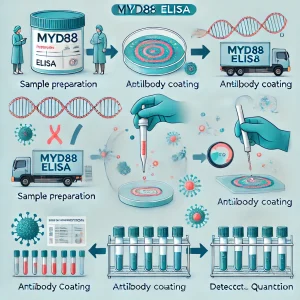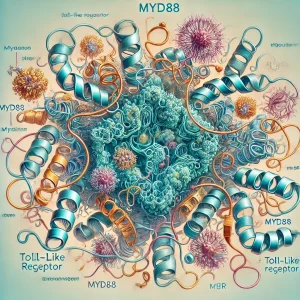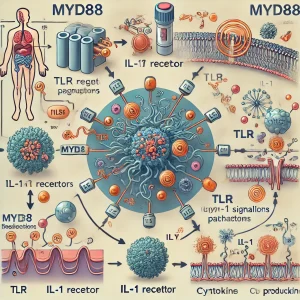Introduction
The Mouse Myeloid Differentiation Primary Response Protein 88 (MyD88) is a key adaptor protein involved in the signaling of Toll-like receptors (TLRs) and interleukin-1 receptors (IL-1Rs), playing a crucial role in innate immunity. The MyD88 ELISA is a widely used immunoassay that allows for the quantitative detection of MyD88 levels in mouse tissue and cell culture samples.
Understanding the role of MyD88 in immune responses is vital for research on autoimmune diseases, inflammatory responses, and infectious diseases. Detailed guidelines on innate immune signaling and MyD88 pathways can be found at the National Institutes of Health (NIH) and National Center for Biotechnology Information (NCBI).
Importance of MyD88 in Immune Responses
MyD88 is a central mediator in the TLR and IL-1R signaling pathways, which are crucial for activating pro-inflammatory cytokines. Studies conducted at Johns Hopkins University and Harvard Medical School have demonstrated the essential role of MyD88 in pathogen recognition and immune activation.
Research on MyD88 deficiency has shown its link to susceptibility to bacterial infections and immune dysregulation, as discussed by the National Institute of Allergy and Infectious Diseases (NIAID). Furthermore, the World Health Organization (WHO) has identified MyD88 as a potential therapeutic target for controlling inflammatory diseases (WHO).
Applications of MyD88 ELISA
1. Immunology and Inflammatory Disease Research
The MyD88 ELISA assay is extensively used in studies focused on autoimmune diseases, sepsis, and chronic inflammation. Research from the Centers for Disease Control and Prevention (CDC) emphasizes the significance of inflammatory biomarkers in disease progression.
2. Pathogen-Induced Inflammation Studies
MyD88 plays a role in viral and bacterial infections, making it a valuable biomarker in pathogen-host interaction studies. The Food and Drug Administration (FDA) provides regulatory insights on biomarker validation in infectious disease research (FDA).
3. Drug Discovery and Therapeutics
Pharmaceutical research institutions, such as the National Science Foundation (NSF), are exploring MyD88 inhibitors as potential therapies for autoimmune diseases. MyD88 targeting drugs are also being investigated at Stanford University for their role in modulating inflammatory pathways.
MyD88 ELISA Protocol Overview
The ELISA (Enzyme-Linked Immunosorbent Assay) for Mouse MyD88 follows standard immunoassay principles:
- Sample Preparation: Tissue lysates or cell culture supernatants are prepared following CDC Laboratory Guidelines.
- Antibody Coating: The ELISA plate is coated with anti-MyD88 capture antibodies, as recommended by PubMed.
- Detection & Quantification: A secondary enzyme-linked antibody detects the MyD88 protein, followed by a colorimetric readout. A complete methodology guide can be found at NIH Research Protocols.
Quality Control and Validation
To ensure reproducibility and accuracy, ELISA assays must undergo rigorous quality control (QC). The National Institute of Standards and Technology (NIST) provides standardized reference materials for ELISA assay validation.
Additionally, the European Centre for Disease Prevention and Control (ECDC) has outlined protocols for reliable biomarker detection (ECDC).
Challenges and Future Directions
Despite the advancements in ELISA-based MyD88 detection, challenges remain, including:
- Cross-reactivity with other signaling proteins.
- Variability in cytokine responses across different mouse models.
- The need for improved assay sensitivity in low-expressing cell types.
Ongoing research at Yale University and University of California, San Francisco (UCSF) is focused on enhancing ELISA sensitivity for detecting low-abundance MyD88 proteins in clinical samples.
Conclusion
The Mouse MyD88 ELISA is a crucial tool for immunological and infectious disease research. By enabling the quantitative detection of MyD88 levels, this assay supports advancements in autoimmune disease therapeutics, inflammatory research, and infectious disease diagnostics. Researchers can find additional MyD88-related resources at:
With continuous advancements in ELISA technologies, the detection and study of MyD88 signaling will remain pivotal for understanding immune responses and developing targeted therapies.


